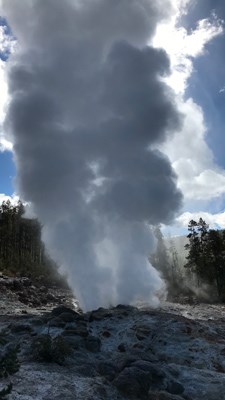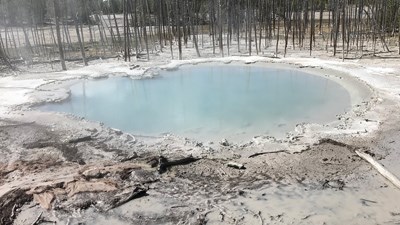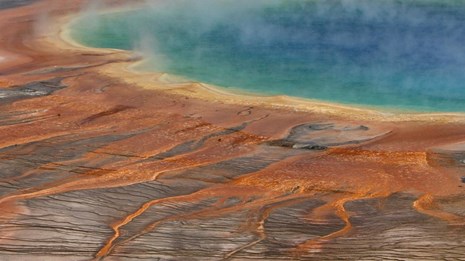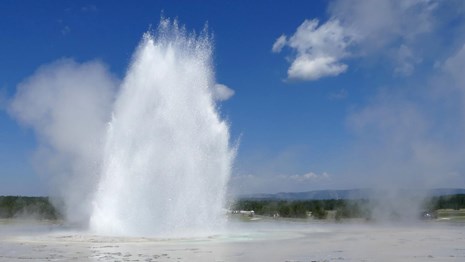Yellowstones National Park Steamboat Geyser Is Active Again
On This Page Navigation
Visit our keyboard shortcuts docs for details
- Elapsing:
- 21 seconds
View of the steam rising from Steamboat Geyser after an eruption earlier in the day.
Tucked away in the Norris Geyser Basin is Steamboat Geyser, the earth'southward tallest active geyser. Its major eruptions shoot water more than than 300 feet (91 thousand). Only Waimangu Geyser in New Zealand has rocketed to greater heights—but not in more than one hundred years. In Yellowstone National Park's recorded history, only two other geysers have exceeded Steamboat in size: Excelsior Geyser in Midway Geyser Basin and Sapphire Puddle in Biscuit Basin. Steamboat'due south minor and major eruptions are entirely unpredictable.

NPS/Dave Krueger
Major Eruptions—Rare and Spectacular
A major eruption of Steamboat Geyser is unforgettable. Water surges from 2 vents to varying heights, and so suddenly h2o is expelled to more than than 300 feet (91 m) loftier. Curtains of water fall to the slope higher up the geyser and collect in torrents rushing back into the vents, conveying huge amounts of mud, sand, and stone that are shot skyward once again and again. Water coats everything with a glistening layer of silica.
A significant amount of eruption debris tin can accrue around the geyser. Even cars in the parking area can be littered with debris.
Mature lodgepole pines have been broken by the downpour, undermined and so washed away by the geyser'south massive discharge. The boardwalk at the base of the hill has been covered by the geyser's outwash.
The water phase of a major eruption lasts three to more than xl minutes. Once the water supply is exhausted, the geyser continues with a powerful steam phase lasting several hours to several days. Its roar is so not bad that conversation near the geyser is hard, and visitors in the Norris Campground, a mile to the north, accept been awakened by the noise.
Not-so-minor Eruptions
Steamboat'southward minor eruptions are about common and accomplish half-dozen–40 ft (2–12 m) and last 1–four minutes. Intervals may be as short every bit two–5 minutes. The higher and longer pocket-sized eruptions ofttimes excite viewers considering a major eruption seems imminent, with water expelling from both the larger n vent and its smaller counterpart. Ordinarily, the geyser rapidly calms down once again.

NPS/Dave Krueger
Dormancy and Rejuvenation
The 1959 Hebgen Lake Earthquake, vii.5 on the Richter Scale, was centered outside the western boundary of Yellowstone. Two years later, for the start time in fifty years, Steamboat Geyser erupted. Some scientists believe this rejuvenation was a straight result of thermal energy shifts caused by the 1959 earthquake; others say it was coincidental. Every bit of this day there is notwithstanding no clear correlation between Steamboat'south eruptions and earthquake activity.
Over the years, Steamboat's eruptions take been sporadic. Some years saw frequent eruptions, such as 1982–1983, when dozens of eruptions occurred. Quiet periods throughout the 1990's and late 2000's were marked past years of dormancy between single eruptions. 1 thing is known, Steamboat Geyser'south future eruptions volition continue to be unpredictable.
While we accept recently experienced a couple of major eruptions, these eruptions practice not signify that Steamboat's eruptions will exist more frequent merely rather are in line with Steamboat's by history. The dynamic nature of this geyser basin, and the geology of Yellowstone as a whole, keeps everyone guessing.

NPS/Dave Krueger
The Cistern Spring Connection
Cistern Spring, at the base of the hill, exhibits changes related to its gigantic neighbor. After 1959, Cistern Jump's temperature gradually rose, mayhap receiving some of this oestrus from Steamboat. Cistern'due south discharge increased in 1965, when Steamboat'due south major eruptions were becoming less frequent. This surge in heat and water was so great that all vegetation immediately south of Cistern was killed, and a colorful silica terrace rapidly grew several feet high. This terrace continues to rise and expand.
Since then, Cistern has as well drained during or afterward a major Steamboat eruption.
Steamboat's Major Eruptions
All recorded major eruptions are listed here. Others may have occurred, but were not necessarily seen if there were no observers in Norris Geyser Basin. The intervals range from 4 days to fifty years. The largest number of recorded eruptions in a year occurred twice, with 48 eruptions in both 2019 and 2020.
| Year | # of Eruptions | Interval |
|---|---|---|
| 2020 | 48 (January 9 and 23; February i, 12, 21, and 28; March vi, 15, and 24; Apr 2, 10, and 27; May viii, fourteen, xix, 23, and 31; June 3, 8, 12, 18, 23, and 29; July 2, 9, 13, xix, 24, and 30; August 3, 9, 14, 20, and 26; September one, 9, 16, and 26; October 5, 14, 19, and 27; Nov 3, 11, xx, and 29; December 11 and 20) | fourteen and 14 days; 9, xi, ten, and 7 days; 7, 9, and nine days; 9, viii, and 17 days; 11, 6, 5, 4, and 8 days; 3, 5, four, 6, five, and 6 days; 3, vii, four, and v days; iv, half dozen, 4, 5, and half dozen days; vi, 7, 6, and nine days; 9, 8, 5, and 7 days; 7, 7, 9, and 9 days; 12 and 8 days |
| 2019 | 48 (January 4, 16, and 25; February ane, 8, 16, and 25; March 4, 11, 17, and 25; April 8 and 25; May three, 8, 13, 20, and 27; June 1, 7, 12, 15, 19, 23, and 28; July 4, 10, 18, 24, and thirty; Baronial 12, xx, and 27; September 3, 11, 17, and 25; Oct 1, 7, 16, 22, and 30; Nov 8, 17, and 27; December 8, xviii, and 26) | nine, eleven, and nine days; 7, seven, 8, and 9 days; vii, 7, 6, and 8 days; fourteen and 17 days; vii, 5, 5, 6, and seven days; 5, six, 5, 3, 4, iv, and 5 days; 5, 6, 8, 6, and six days; xiii, 7, and 7 days; 6, 8, 6, and 8 days; 6, vi, ix, 6, and 8 days; 9, 9, and 10 days; 11, ten, and 8 days |
| 2018 | 32 (March 15, April 19 & 27, May 4, 13, xix, & 27, June 4, 11, & xv, July vi & 20; August 4, 22, & 27; September 1, 7, 12, 17, 24, & 29; October 8, fifteen, 23, and 31; November vii, 15, 21, and 28; December 8, 17, and 25) | iii years, 193 days; 35 & vii days; 7, 8, half dozen, & vii days; 7, 6, & 4 days; xx & fourteen days; 14, 18, & five days; 5, half-dozen, 5, 5, vii, & 5 days; 9, seven, 8, and vii days; 7, 7, half-dozen, and 7 days; nine, nine, and 8 days |
| 2014 | 1 (September three) | i year, 34 days |
| 2013 | 1 (July 31) | 6 years, 162 days |
| 2007 | 1 (February. 21) | one years, 274 days |
| 2005 | 1 (May 23) | 1 year, 213 days |
| 2003 | iii (March 26, April 27, October 22) | 193 days; 32 days; 178 days |
| 2002 | two (April 26, September 13) | 1 year, 359 days; 140 days |
| 2000 | 1 (May two) | eight years, 214 days |
| 1991 | 1 (October 2) | 1 yr, 120 days |
| 1990 | 1 | 237 days |
| 1989 | 3 | 4.3 years–107 days |
| 1984 | 5 | 19–93 days |
| 1983 | 12 | four–107 days |
| 1982 | 23 | four–43 days |
| 1979 | one | 299 days |
| 1978 | two | 9 years, 216 days; 147 days |
| 1969 | one | 206 days |
| 1968 | At least 3 | 42–150 days |
| 1967 | At least iii | xv–310 days |
| 1966 | At least 10 | 11–77 days |
| 1965 | 22 | seven–50 days |
| 1964 | 29 | v–45 days |
| 1963 | 26 | 6–32 days |
| 1962 | At least vii | 8–360 days |
| 1961 | At least 1 | l years |
| 1911 | At least 1 | nine years |
| 1902 | At least 1 | 8 years |
| 1894 | At least 1 | 2 years |
| 1892 | At to the lowest degree one | <1 year |
| 1891 | At least 1 | <1 year |
| 1890 | At to the lowest degree one | 12 years |
| 1878 | At least two |

Hydrothermal Systems
Yellowstone'southward hydrothermal systems are the visible expression of the immense Yellowstone volcano.

Hydrothermal Features
Yellowstone preserves earth'southward most extraordinary collection of hot springs, geysers, mudpots, fumaroles, and travertine terraces.

Norris Geyser Basin
Take a virtual trip around the hottest geyser basin in the park, then program a visit in person.
cookreprockless1958.blogspot.com
Source: https://www.nps.gov/yell/learn/nature/steamboat-geyser.htm
0 Response to "Yellowstones National Park Steamboat Geyser Is Active Again"
Post a Comment